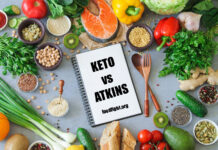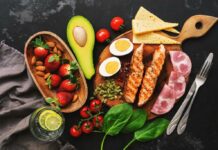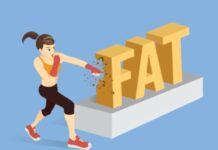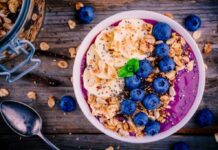You can turn your body into a fat-burning machine with the right lifestyle. It isn’t even all that difficult. It doesn’t require any shakes, pills, or programs, just the right information and the desire to follow it.
Products designed to help you burn fat are usually either unsustainable or unhealthy. Crash diets and toxic protein powders do little more than empty your pocketbook and leave you heavier than when you started.
There are physiological reasons why you gain back more weight than you lose with these gimmicks, but that is a topic for a future article.
Fat Burning Myth: Calories-In, Calories-Out
The “counting calories” approach to weight loss is old and tired. I have no idea where such an absurd concept originated, but it’s obviously not working. Almost every product on supermarket shelves is either low-calorie or fat-free, yet obesity rates continue to climb.
Having a lean physique doesn’t have to involve pain and suffering. A strong build and low body-fat ratio is our natural state when hormone levels are healthy, and achieving this does not require deprivation, charting meals with smartphone apps, or ingesting toxic drugs.
When it comes to hormone levels, there are many contributing factors like stress, the quality of your sleep, your exercise regimen, etc.
Still, diet is one of the most important elements when the goal is burning fat, mainly because hormone levels are greatly influenced by what we eat.
Counting calories will certainly result in weight loss initially, but physiologically it simply can’t continue. Eventually, your body will turn against you and begin fighting for the calories you consume.
This is why most calorie-counters lose some weight but eventually reach a point they cannot go beyond.
Fat Burning Myth: The Obesity Gene
Our genes get blamed for just about every physical limitation in human life. It’s an easy-out that requires little explanation and keeps us trapped in the hamster wheel of disease, drug treatment, and surgery.
Cancer? It’s in your genes — nothing you can do.
Heart disease? It’s genetic. Thank your parents.
Diabetes? High cholesterol? Osteoporosis? Bad back? Genes, genes, genes, genes. Don’t worry; there are plenty of drugs you can take for the rest of your life.
Let me tell you something you may not know.
Our genes haven’t changed in 40,000 years, but it’s only recently that we’ve seen an epidemic of sickness and disease in the human race. How is that possible if our genes are to blame?
Our genes definitely play a part in our weight, but probably not in the way you’re thinking. Obesity is not caused by some spooky error in your DNA passed down to you from your parents.
Being overweight results from nothing more than living life in opposition to our genetic programming.
Are You Sugar Adapted?
Suppose you eat a typical American diet filled with processed carbohydrates like pasta, bread, rice, cereal, chips, breakfast bars, baked goods, soda, and artificial sugar (foods that come in wrappers, cans, bags, and boxes). In that case, your genes will change how your body handles food.
In effect, you become “sugar-adapted,” which means you teach your body to burn sugar and carbohydrates for fuel since there is always an ample supply of them.
Sugar-adapted people are typically overweight, experience noticeable periods of fatigue during the day, and often cravings for comfort foods or foods that are emotionally pleasing. They have a difficult time with dieting because calorie counting always leaves them hungry. Vegetables and fruits don’t satisfy them. They think a salad for dinner isn’t “real food” and that they need something heavier or they’ll “starve” the rest of the night.
How does being sugar-adapted make you overweight?
All carbohydrates in the bloodstream are converted to glucose (sugar) which causes insulin levels to spike.
Insulin is the hormone responsible for storing excess sugar as fat — the higher your blood sugar, the higher your insulin levels. In addition, the more fat you’ll store.
Eventually, you become insulin resistant, at which point it becomes nearly impossible for the body to burn fat no matter how few calories you consume or how much you exercise.
To make matters worse, since the body has learned to use sugar as its primary energy source, you’ll be hungry again once insulin has cleared glucose from your bloodstream.
The body of a sugar-adapted dieter will not only retain the calories it consumes, but it will also be more likely to store fat and make you crave more sugar and carbs soon after you’re done eating.
Can you see why getting thin by counting calories can be so difficult?
How to Become a Fat-Burning Machine
The way to become a fat-burning machine is to teach your body to burn fat for fuel instead of sugar. This can be done fairly quickly and easily since our genes are already hardwired this way, to begin with.
Fat-adapted people stay thin effortlessly. They get hungry less often, stay satiated longer when they eat and have plenty of energy. They have few sugar cravings and tend to pine for their favorite nutrient-dense snacks instead. Even during those rare times when sugar and carbs are consumed in excess, their bodies handle them efficiently and resist storing fat.
So how do you become fat-adapted? By limiting sugar, carbs, and grains in the diet and increasing your intake of healthy fats.
Our medical system has incorrectly vilified fat as the cause of many health issues, but healthy fat is an absolute necessity for good health.
- If sugar/carbs stay low, insulin stays low.
- If insulin stays low, there is no fat storage.
- If there is no sugar to burn for fuel, the body burns fat instead. In essence, you become “fat-adapted.”
Note: You should NOT fill your cabinets with processed junk marketed as “low-carb” diet foods. These products are void of nutrition and filled with harmful chemicals.
Also, when you see “low-fat” or “fat-free,” think CARB-BOMB! When fat is removed, sugar takes its place.
Best Food Choices for Becoming a Natural Fat Burner
Let’s be honest, the goal of dieting isn’t really to lose weight. What we actually want is to lose FAT. It’s the mirror we want to change, not necessarily the scale, which is strange because we tend to look at the scale as being the ultimate indicator of success.
The way to a thin, sexy body is to focus on getting healthy rather than simply weighing less. If your efforts to be thin result in sickness down the road from starving yourself or ingesting toxic manufactured products, you’ve defeated the purpose.
It might sound strange if you want to become fat-adapted, but you have to eat more fat. Of course, those fats should be healthy fats, ones that are naturally found in real food.
Beef, poultry, eggs, nuts (macadamia, walnuts, hazelnuts, almonds, pecans), seeds, coconut and coconut oil, avocados, olives and olive oil, and fatty fish (tuna, mackerel, herring, trout, sardines, and salmon), are foods you should regularly include in your meals.
These are certainly not the only foods you should be eating, but trying to eliminate fat from your diet is only sabotaging your efforts. Make sure you’re also getting appropriate amounts of leafy green veggies and fruits that are low in sugar, like berries and stone fruits.
Assuming no other limiting factors are present, following this simple advice should result in an AVERAGE of 1-2 pounds of fat loss per week without exercise. Be prepared for fluctuations in your energy levels for a few weeks as your genes are reprogrammed to burn fat for fuel.
Once it occurs, you’ll notice a huge difference in the way you look and feel.






